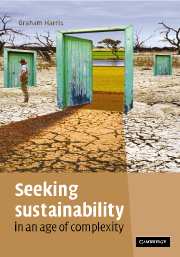Book contents
- Frontmatter
- Contents
- Acknowledgements
- 1 Preamble: the world we are in
- 2 Complexity and complex systems
- 3 New science, new tools, new challenges
- 4 The complexity of ecology
- 5 The generation of complexity
- 6 Micro-interactions and macro-constraints
- 7 A sense of place
- 8 Created landscapes and our changing sense of place
- 9 Catchment form and function
- 10 Catchment loads: ecosystem impacts
- 11 Change detection, monitoring and prediction
- 12 Evidence, uncertainty and risk
- 13 Modified landscapes: biodiversity
- 14 Function in fragmented landscapes
- 15 Environmental flows
- 16 Evidence for global change
- 17 Values and beliefs
- 18 Managing environmental, social and economic systems
- 19 Linking multiple capitals in a changing world
- 20 Community, capacity, collaboration and innovation
- 21 A new environmental paradigm
- 22 Emergent problems and emerging solutions: developing an ‘ecolophysics’?
- 23 Avoiding collapse
- Index
4 - The complexity of ecology
Published online by Cambridge University Press: 21 March 2011
- Frontmatter
- Contents
- Acknowledgements
- 1 Preamble: the world we are in
- 2 Complexity and complex systems
- 3 New science, new tools, new challenges
- 4 The complexity of ecology
- 5 The generation of complexity
- 6 Micro-interactions and macro-constraints
- 7 A sense of place
- 8 Created landscapes and our changing sense of place
- 9 Catchment form and function
- 10 Catchment loads: ecosystem impacts
- 11 Change detection, monitoring and prediction
- 12 Evidence, uncertainty and risk
- 13 Modified landscapes: biodiversity
- 14 Function in fragmented landscapes
- 15 Environmental flows
- 16 Evidence for global change
- 17 Values and beliefs
- 18 Managing environmental, social and economic systems
- 19 Linking multiple capitals in a changing world
- 20 Community, capacity, collaboration and innovation
- 21 A new environmental paradigm
- 22 Emergent problems and emerging solutions: developing an ‘ecolophysics’?
- 23 Avoiding collapse
- Index
Summary
A changing world view within ecology
In the previous chapters I have tried to show that an explanatory framework based on complexity, emergence and uncertainty is a necessary framework to use if we are to understand our globalised and interconnected world. I have also argued that any solutions will be bounded by biophysical reality. If I have succeeded in that aim then there is a need to examine the impact of such a framework on some of the basic scientific foundations of environmental management because, as I have said, science is not totally value-free and there are many deeply contingent factors which have brought us to our present state of knowledge. The science that informs our management of natural resources and the environment is called ecology. Ecology is a curious subject, and one that is notoriously difficult to pin down. Although ecology has a long intellectual history it has only really come into vogue since the 1960s; and since then the word has come to mean almost anything to anyone.
The science of ecology attempts to understand the interactions between the organisms and processes that form the basis of what has been called the ‘economy of nature’. The word ‘ecology’ has also been used by lobby groups and marketing gurus and on everything from soap powder to popular culture. Some insist that ecology is not a proper science at all, for the reason that controlled experiments and tests of hypotheses are so difficult to do in the natural world.
- Type
- Chapter
- Information
- Seeking Sustainability in an Age of Complexity , pp. 39 - 52Publisher: Cambridge University PressPrint publication year: 2007



